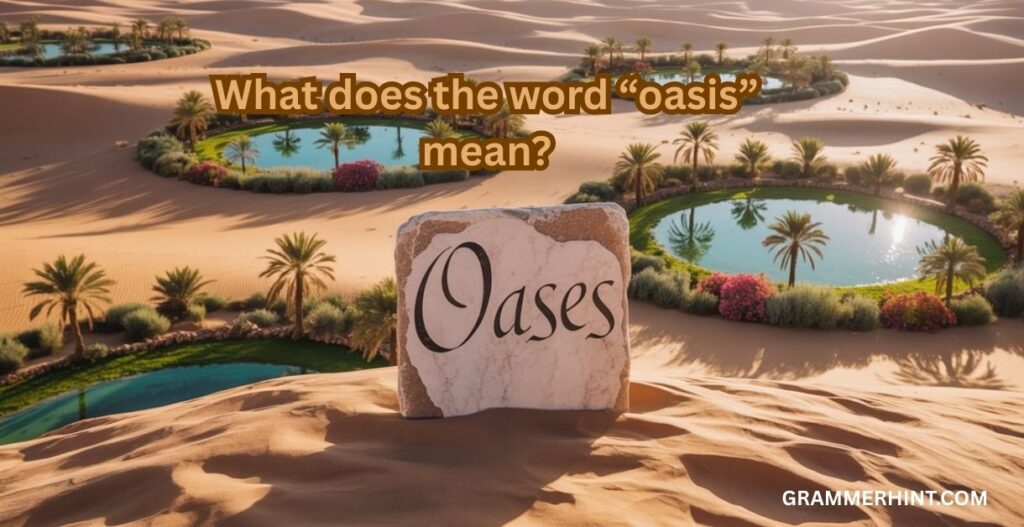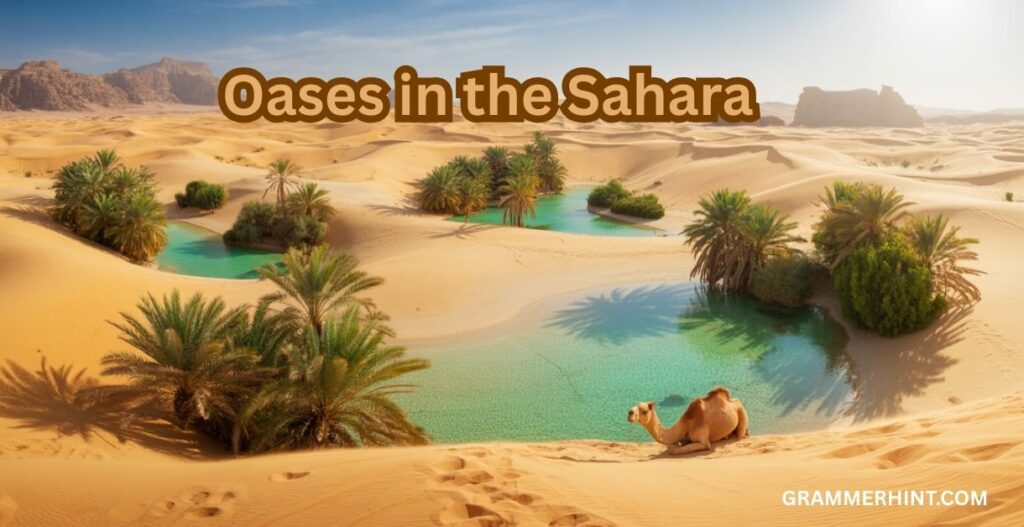Language often surprises us with hidden quirks, and the plural of oasis is one such example. While many English plurals simply add an “-s” or “-es,” words borrowed from other languages don’t always follow the rule.
If you’ve ever paused to ask yourself whether it’s “oasis” or “oases,” you’re not alone. The answer connects geography, history, and even a bit of etymology.
In this article, we’ll explore the oasis plural form, pronunciation, meaning, origins, and usage in both singular and plural. We’ll also look at real-world examples from desert survival to urban design—where the word naturally fits.
How to pronounce “oasis”?
The oasis pronunciation is straightforward once you break it down. It’s pronounced as:
/oʊˈeɪ.sɪs/
- First syllable: “oh”
- Second syllable: “AY” (stressed syllable)
- Final syllable: “sis”
When pluralized to oases, the pronunciation shifts slightly:
/oʊˈeɪ.siːz/
- The “-es” ending becomes “eez.”
Understanding syllable stress is important because it distinguishes similar-looking words. In oasis, the stress falls on the second syllable (“AY”). In oases, it stays consistent but extends smoothly with the “eez” sound.
What does the word “oasis” mean?

At its core, the oasis definition is:
A fertile spot in a desert where water is found.
However, in English, the word has broadened. Beyond geography, “oasis” can also describe any sanctuary, retreat, refuge, respite, or shelter—a place of calm refuge and tranquility in chaos.
Examples in real contexts:
- In geography: An oasis in the Sahara Desert provides travelers with natural water sources in the desert and lush greenery in desert landscapes.
- In daily life: My favorite café downtown is an urban oasis where I can escape the noise.
- In literature: The park served as a spiritual sanctuary, an oasis of peace in the middle of the city.
So, the oasis meaning in English extends from physical survival in deserts to emotional or spiritual relief in modern environments.
“Oasis” singular and plural
Here’s where things get interesting. The oasis plural is not “oasises.” Instead, the plural form of oasis is oases.
Why the plural is “oases”?
The rule follows English’s treatment of words ending in “-is” that derive from Greek or Latin. Instead of simply adding an “s,” the “-is” changes to “-es.”
- Oasis → Oases
- Synthesis → Syntheses (plural of synthesis)
- Analysis → Analyses
- Thesis → Theses
- Crisis → Crises
Interestingly, not all words ending in “-is” follow this path. For example, calculus (from Latin) becomes calculi (plural of calculus). These irregularities highlight the impact of etymology.
Thus, the oasis plural form—oases—follows a pattern rooted in ancient languages rather than modern English spelling habits.
Using “oasis” and “oases” in sentences
Let’s see the difference between oasis vs oases with examples.
Oasis (singular):
- “After walking all day under the sun, we finally reached an oasis.”
- “The library was an oasis of calm during exam week.”
- Email example: Dear Sarah,
Yesterday’s hike was exhausting, but stumbling upon that hidden oasis near the dunes felt magical. Let’s plan another trip soon.
Best,
Kevin
Oases (plural):
- “Several oases in the Sahara have supported trade caravans for centuries.”
- “The city’s parks are modern oases, offering residents a peaceful escape.”
- Email example: Hi Mark,
I’ve mapped out all the oases in the Sahara relevant to our research. They highlight critical desert survival oases where trade routes thrived. I’ll share the report tomorrow.
Regards,
Dr. Elena
These examples show how both singular and plural forms work in geography, daily life, and professional communication.
Origin of the word “oasis”

The oasis origin Greek and oasis etymology Egyptian provide insight into why the plural form looks the way it does.
- Ancient Egyptian: The word originally came from the Egyptian wḥt, meaning “dwelling place” or “fertile place.”
- Greek adoption: The Greeks adapted it as ὄασις (oasis).
- Latin borrowing: From Greek, it moved into Latin as oasis.
- English usage: Finally, it entered English in the early 17th century, carrying both its geographic and metaphorical meanings.
Because English inherited it through Greek and Latin, it follows the plural nouns ending in “-is” rule, giving us oases.
Synonyms for “oasis” and “oases”
Language thrives on variety. Knowing oasis synonyms helps avoid repetition and adds nuance.
Synonyms for “oasis” (singular):
- Refuge
- Sanctuary
- Haven
- Retreat
- Respite
- Shelter
- Calm refuge
Synonyms for “oases” (plural):
- Sanctuaries
- Havens
- Shelters
- Refuges
- Retreats
For example, “The mountains offered a retreat from daily stress, a true sanctuary for the soul.”
Oases in the Sahara

When most people hear the word “oasis,” they imagine the Sahara Desert. This massive expanse of arid land relies on scattered oases for survival.
- Desert survival oases: Historically, caravans planned routes based on water availability.
- Greenery in arid regions: Palm trees, shrubs, and crops grew in fertile soil around these water pockets.
- Trade hubs: Many oases in the Sahara became thriving towns.
Without oases, travel and settlement in such regions would have been nearly impossible.
Artificial oases and conservation
Not all oases are natural. Today, artificial oases play a role in urban planning and desert agriculture.
- Urban oasis examples: Parks, botanical gardens, rooftop gardens.
- Conservation efforts: Restoring dried waterbeds or building green corridors for wildlife.
- Sustainability: Creating artificial oases reduces heat, provides shade, and offers communities a respite in harsh environments.
For example, Singapore’s Gardens by the Bay functions as an urban oasis, blending technology with ecology.
Oasis vs Oases
It’s easy to confuse the forms, so here’s a quick reference:
| Singular | Plural | Example Sentence |
|---|---|---|
| Oasis | Oases | “Nomads found two oases in the Sahara.” |
| – | – | “The garden is my personal oasis.” |
This makes the distinction between oasis plural and oasis singular clear at a glance.
Sources
- Merriam-Webster: Oasis
- Oxford English Dictionary: Oasis
- Cambridge Dictionary
- Academic notes on Sahara trade routes and desert surviva









